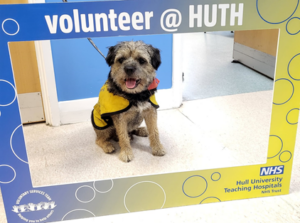- Reference Number: HEY1068/2022
- Departments: Corporate Nursing
- Last Updated: 31 December 2022
A guide for patients, families and carers
Introduction
This leaflet gives you general information about Dementia and Delirium Care in Hospital. Most of your questions should be answered by this leaflet. It is not intended to replace the discussion between you and the team caring for you / your relative but may act as a starting point for discussion. If after reading it you have any concerns or require further explanation, please discuss this with a member of the healthcare team.
What is Dementia and Delirium?
Dementia is a syndrome with a progressive decline in memory, reasoning, communication skills and the ability to carry out daily activities. Its progression varies from person to person and each person will experience dementia in a different way.
There are 3 main types of dementia, vascular dementia, dementia with Lewy bodies and Alzheimer’s disease. Behavioural and psychological symptoms of dementia such as agitation, anxiety and restlessness can sometimes occur especially during a period of illness requiring a stay in hospital.
Delirium is a sudden change in mental state which may include confusion, agitation, personality change, difficulties with understanding and memory loss. Delirium may also be referred to as acute confusion.
Common causes of delirium are pain, infection, constipation, dehydration / hydration, medication and the environment.
Please notify a staff member if you notice a change in your relative’s behaviour.
If delirium is suspected, tests will be carried out to look for possible causes, treating the underlying cause treats the delirium. The recovery time is different for each person; some people with underlying dementia may take a little longer to get better. If delirium continues, we may ask the mental health team for advice.
In hospital we will
Train our staff. Training is provided for all staff to enable them to provide person centered care with respect for the person as an individual and recognising their life story.
Work in partnership with families, friends and carers in care planning and decision making with flexibility to suit the patient and family. We will work with you to plan your / your relative’s care. This includes ensuring care plans are person-centred. We gather information of the personal life story and involve family and carers in care planning to support the patient in their daily activities such as eating and drinking, continence and comfort
Assess for early identification of dementia. The use of assessment and screening by skilled staff to ensure any symptoms of dementia or delirium are identified and care adapted to the patient. This also enables us to identify and diagnose a patient who may have not been diagnosed before.
Provide Environments which are dementia friendly. We try to minimise the number of moves around the hospital, encourage the personalising of bed spaces, staff and volunteers support rehabilitation including activities to encourage orientation and stimulation.
Ask for feedback. We look to continuously improve our services for people living with dementia, memory loss and delirium. We have a dedicated ‘Friends and Family Feedback’ form. We welcome all feedback whether that’s praise when good care has been delivered or where we need to improve. Feedback can be provided via a paper form (just ask the nurse in charge for a form), follow the URL code or scan the QR code below:
http://ratenhs.uk/jbOmKV

What we provide
The Butterfly Scheme is an opt-in scheme whereby we display a discreet symbol (blue for dementia, white for delirium or memory support) to assist us in providing person centered care. We gather information from you such as potential signs of distress/anxiety, normal routines and life story to help us to minimise those behavioural and psychological symptoms mentioned above. Please speak to a member of staff for further details
John’s Campaign recognises the importance of family and carers during a patient’s stay in hospital. We encourage flexibility around visiting hours to support your loved one living with dementia. We also have a relative’s room which is located on 8th floor providing you with somewhere to sleep or have a cup of tea whilst still being near to your loved one. Please speak to a member of staff for more details.
Volunteers are working with the ward teams to provide additional companionship during the patient’s hospital stay and stimulating activities such as knitting, reminiscence discussions and games. We also welcome several pet therapy dogs into the hospital who visit wards across Hull Royal Infirmary and the Castle Hill site.

![]()

Additional Services
Mental Health Liaison Service
Sometimes we will refer a patient to the older person’s mental health team for further advice, support and to also begin the process in reaching a diagnosis of dementia or delirium. We also refer for guidance on the use of medication to manage symptoms associated with dementia or delirium.
Memory Services
We will sometimes make a referral to the memory clinic in the community following discharge. Hull memory clinic provides support for anyone with a memory problem. The team work with the person’s supporter to ensure a quality assessment and treatment process that takes everyone’s needs into account.
Enhanced Care Team
A patient may require a period of enhanced supervision in order to maintain their safety and assist in managing symptoms by providing some dedicated time to the patient. The staff will inform you if this is required for your loved one.
Dementia Lead Consultant and Matron
We have a lead consultant and a lead matron who oversee dementia and delirium care across the organisation. They are both available for further advice and support (please see a member of staff for details)
Caring for a person living with dementia can be extremely rewarding but at times can be upsetting and stressful. Sources of support include family and friends, health professionals, support groups and organisations are listed below:
Community Support
Alzheimer’s Society
Information, advice and support to people with dementia and their family/carers Tel: 01482 211255 or hulleastriding@alzheimers.org.uk
Butterflies Memory Loss Support Group
Self- help group providing a drop in service with activities for both carer and cared for on tel: 07921505529 or via e-mail to butterfliesmlsg@yahoo.co.uk
East Riding Carers Support Service
Information, advice, support and activities on Tel 08009176844
Hull Carers Information and Support Centre
Information, advice and support on tel: 01482 222220 or via email to Chcpcarersinfo@nhs.net
Age UK
Information, advice, support, activities and services on tel: 01482 324644
Herbert Protocol
National scheme used by Humberside police to assist in locating a person living with dementia that goes missing or does not return home when expected. www.humberside.police.uk/issues/vulnerability or visit your local police station.
Under the General Data Protection Regulation and the Data Protection Act 2018 we are responsible for maintaining the confidentiality of any information we hold about you. For further information visit the following page: Confidential Information about You. www.hey.nhs.uk/privacy/data-protection
If you or your carer needs information about your health and wellbeing and about your care and treatment in a different format, such as large print, braille or audio, due to disability, impairment or sensory loss, please advise a member of staff and this can be arranged.

